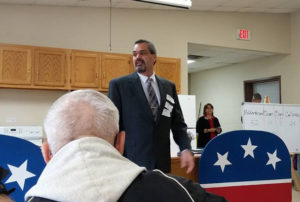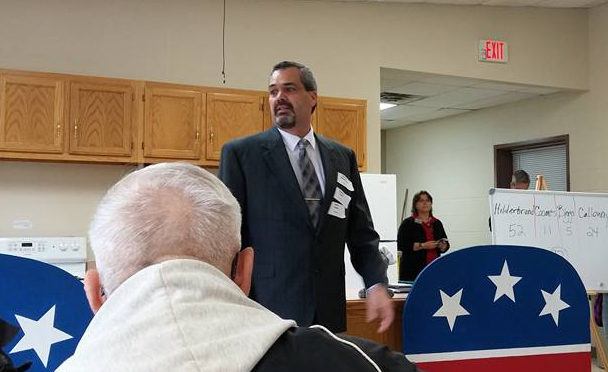Why does removing the small business exemption mean increasing taxes on the poorest of the poor?
Submitted by Richard Hilderbrand, Kansas District 13 Senator
There is a lot of frustration among the citizens of Kansas over the current legislature’s inability to balance the budget. This frustration is well-founded and must be addressed with a fiscally responsible solution. There is a large percentage of citizens that believe the small business exemption is the cause and want to see the exemption removed. If a tax proposal to remove the LLC exemption was ever to come before both chambers, it would likely pass by a veto-proof margin. If this is the case, then why hasn’t this happened yet? It is obvious this is the one part of the tax plan that most legislators and citizens both believe should be changed. One only needs to look at The Hays Daily News article dated May 5, 2017. In this article, it has this very revealing quote “If we take that part out of the overall tax plan, we take all of our leverage out,” said Sen. Laura Kelly, D-Topeka. Kelly said closing what is often referred to as the LLC loophole is the “politically palatable” part of the tax hikes, but it isn’t the bulk of the money the state needs to raise. “The real money in the tax cuts was not in that provision, it was in the reduction of the brackets,” she said, referring to income tax rates.

In a recent Docking Institute poll, it asked how the citizens of Kansas wanted their legislators to fix the current budget crisis. This is what this poll showed: 41 percent want their legislators to cut spending, 34 percent want their legislators to cut spending and increase taxes, and 25 percent want their legislators to increase taxes to fix this budget crisis. You will notice that 75 percent think all or part of the solution is to cut spending, while none think the solution is to raise state spending.
http://www.fhsu.edu/uploadedFiles/executive/docking/Kansas%20Speaks%202017(1).pdf
Then why do the only bills that we are voting on so far have large increase in spending along with over $1 billion in new taxes to pay for it? This not only defies the wishes of our constituents, but more importantly it is reckless and is fiscally irresponsible. I have heard from those that want to pass this massive tax and spend policy that this is the hardest thing to do. I strongly disagree with this view. The hardest thing to do is continue to vote on your principles and to not be swayed by the emotions of the day. We must get our finances in order and established for a long-term solution, so that our state can get back on the road to recovery.
We do have a budget crisis and our constituents are counting on us to fix this problem. This is something that we must do, we must quit playing politics over this issue. The constituents in Kansas expect the legislators to fund education to meet the requirements of the ruling handed down by the Kansas Supreme Court. They also expect the legislators to fully fund KPERS and to quit deferring the payments that have become the norm. They also want the money that is ear marked for our highways to stay in KDOT.
Just last night the House took up SB 30. It failed on a vote of 53-yeas to 68-nays. If this bill would have passed, and subsequently passed the senate, it would have looked like this:
*It would have raised taxes on every single tax payer by $1.217 billion over the next two years.
*Lowered the minimum earned income from $5,000 to $2,500 for single filers, and from $12,500 to $5,000 for families.
*Retroactively raised the lowest tax bracket for families making $0-$30,000 from 2.7 percent to 2.9 percent for the 2017 tax year.
*Raised the lowest tax bracket for families in year 2018 from 2.9 percent to 3.1 percent.
*Retroactively raised the middle tax bracket for families making $30,001 – $60,000 from 4.6 percent to 4.9 percent for the 2017 tax year.
*Raised the middle tax bracket for families in year 2018 from 4.9 percent to 5.25 percent.
*Retroactively created a new top tax bracket for families making $60,001 and above from 4.6 percent to 5.2 percent for the 2017 tax year.
*Raised the new top tax bracket for families in year 2018 from 5.2 percent to 5.7 percent.
*Retroactively raised the lowest tax bracket for individuals making $0 -$15,000 from 2.7 percent to 2.9 percent for the 2017 tax year.
*Raised the lowest tax bracket in year 2018 from 2.9 percent to 3.1 percent.
*Retroactively raised the middle tax bracket for individuals making $15,001 – $30,000 from 4.6 percent to 4.9 percent for the 2017 tax year.
*Raised the middle tax bracket in year 2018 from 4.9 percent to 5.25 percent.
*Retroactively created a new top tax bracket for individuals making $30,001 and above from 4.6 percent to 5.2 percent for the 2017 tax year.
*Raised the new top tax bracket in year 2018 from 5.2 percent to 5.7 percent.
*Retroactively repealed the small business exemption.
http://www.kslegislature.org/…/doc…/ccr_2017_sb30_h_2129.pdf
This tax bill would have put an even bigger burden on our constituents that are struggling to make ends meet. How can we as a state ask an individual that is making only $2,500 and a family making $5,000 a year to retroactively pay for our out of control spending? It would have classified, per this new tax structure, an individual making $30,001 and a family making $60,001 as rich and taxed them the same rate as someone making $1 million. This is not a fiscally responsible tax plan.
The state has increased its spending in the general fund from $5,268,100,000 in 2010 to an estimated $6,306,030,075 for 2017. This is an almost 20 percent increase in spending over seven years. That is an average increase of 2.46 percent per year. The average rate of inflation during that same period is only 1.7 percent per year. If the state’s spending would have been the same as the rate of inflation, our spending in 2017 would only be $5,807,414,859. The estimated revenue for 2017 is $6,073,100,000. That would have left the state with $265,685,140.54 to go towards meeting some of our other needs that I highlighted earlier.
http://budget.ks.gov/publications/FY2017/FY2017_Comparison_Report–UPDATED–8-15-2016.pdf
http://budget.ks.gov/publications/FY2017/FY2017_GBR_Vol2.pdf
So, I ask this question: Why must the poorest of the poor pay for the states irresponsible fiscal policies?
